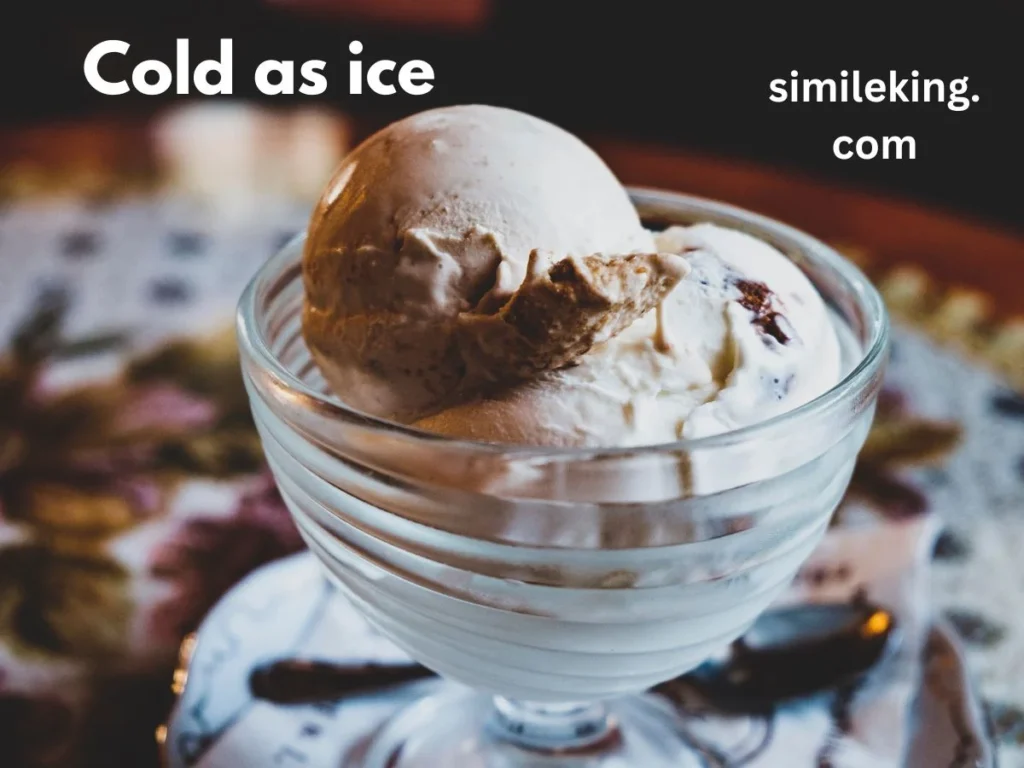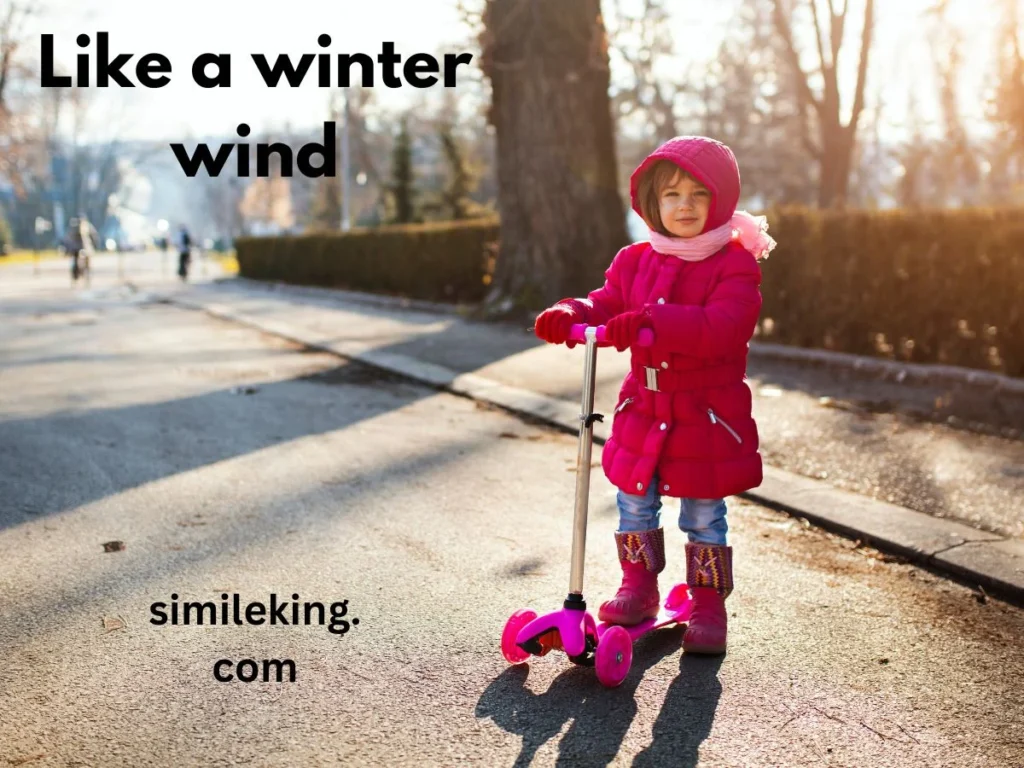When you want to describe the sensation of being cold, similes offer a vivid and relatable way to convey that feeling. Using similes not only enhances your writing but also adds color and emotion to everyday conversations. This article explores 15+ similes for being cold and includes tips on how to use them effectively in different contexts—from professional writing to casual texting. Additionally, we’ll provide 7 user-friendly texting examples optimized for clarity and relatability.
Understanding Similes for Being Cold
A simile is a figure of speech that compares two different things using the words “like” or “as.” It helps readers or listeners imagine a situation more clearly by linking it to something familiar.
When describing coldness, similes often evoke strong imagery associated with the sensation of chill, shivering, or freezing. Using the right simile can communicate not just the physical feeling but also the emotional undertone—whether it’s discomfort, resilience, or even a cool, calm demeanor.
Why Use Similes Instead of Plain Descriptions?
- Enhance imagery: Instead of simply saying “I am cold,” a simile paints a picture in the reader’s mind.
- Add personality: Different similes carry different tones — formal, playful, poetic, or direct.
- Engage your audience: Vivid comparisons make your writing or speech more memorable.
- Adapt to context: Whether you’re writing a report or texting a friend, similes can be tailored for the right mood.
15+ Effective Similes for Being Cold
Here is a comprehensive list of similes to describe coldness, ranging from formal to casual:
1. Cold as ice

- Meaning: Extremely cold.
- Tone: Neutral, professional.
- Example: “The air was as cold as ice during the winter morning meeting.”
2. Like a freezer
- Meaning: Very cold, similar to the inside of a freezer.
- Tone: Casual, descriptive.
- Example: “Her hands felt like a freezer after walking outside without gloves.”
3. Cold as the Arctic
- Meaning: Extremely cold, evoking the harsh Arctic climate.
- Tone: Dramatic, vivid.
- Example: “The night breeze was as cold as the Arctic, making us hurry indoors.”
4. Like a winter wind

- Meaning: A biting, penetrating cold similar to cold winter wind.
- Tone: Poetic, casual.
- Example: “The gust hit me like a winter wind, chilling me to the bone.”
5. As chilly as a mountain stream
- Meaning: Refreshingly cold, crisp.
- Tone: Gentle, natural.
- Example: “The water felt as chilly as a mountain stream.”
6. Like frost on a windowpane
- Meaning: Delicately cold, with a crisp texture.
- Tone: Poetic, descriptive.
- Example: “Her breath was visible, like frost on a windowpane.”
7. Cold as steel

- Meaning: Harshly cold, unemotional.
- Tone: Strong, formal or metaphorical.
- Example: “His handshake was cold as steel, lacking warmth or friendliness.”
8. Like a snowman’s touch
- Meaning: Soft yet cold.
- Tone: Casual, playful.
- Example: “Her fingers were like a snowman’s touch after playing outside.”
9. As frosty as a winter morning
- Meaning: Very cold, typical of a fresh winter morning.
- Tone: Neutral, descriptive.
- Example: “The garden looked as frosty as a winter morning.”
10. Like ice running through veins
- Meaning: Feeling extremely cold internally or emotionally numb.
- Tone: Dramatic, metaphorical.
- Example: “Fear made her feel like ice running through her veins.”
11. Cold as the depths of a glacier
- Meaning: Deep, profound cold.
- Tone: Poetic, strong.
- Example: “The cave was as cold as the depths of a glacier.”
12. Like a polar plunge
- Meaning: Shockingly cold, sudden chill.
- Tone: Energetic, casual.
- Example: “Jumping into the lake was like a polar plunge.”
13. As biting as a Siberian blast
- Meaning: Very harsh, biting cold.
- Tone: Dramatic, vivid.
- Example: “The wind was as biting as a Siberian blast.”
14. Like a cold shower
- Meaning: Sudden and unpleasant chill.
- Tone: Casual, informal.
- Example: “The unexpected rain was like a cold shower.”
15. Cold as a witch’s heart
- Meaning: Emotionally and physically cold.
- Tone: Dramatic, literary.
- Example: “Her stare was as cold as a witch’s heart.”
Nuances of Tone: When to Use Which Simile?
Choosing the right simile depends on your audience and purpose. Here’s a quick guide:
| Simile | Tone | Use Case |
| Cold as ice | Neutral, professional | Formal writing, presentations |
| Like a freezer | Casual | Everyday conversation, texts |
| Cold as the Arctic | Dramatic, poetic | Creative writing, storytelling |
| Like a winter wind | Poetic, casual | Personal narratives, poetry |
| As chilly as a mountain stream | Gentle, natural | Nature descriptions, friendly contexts |
| Cold as steel | Strong, metaphorical | Business, emotional tone |
| Like a snowman’s touch | Playful, casual | Informal talks, social media posts |
Polite and Professional Alternatives to “Being Cold”
If you want to express coldness in a more polite or formal way—especially in business or academic settings—you might prefer phrases like:
- Feeling chilled
- Experiencing a drop in temperature
- Subject to cool conditions
- Experiencing a brisk climate
- Encountering a low-temperature environment
Example:
“In today’s fieldwork, participants experienced a brisk climate that affected their performance.”
Casual Alternatives for Everyday Conversation
For informal chats or texting, here are some friendly, lighthearted ways to describe feeling cold:
- “I’m freezing my fingers off!”
- “It’s like I’m wrapped in a block of ice.”
- “I feel like I just jumped into an ice bath.”
- “It’s chilly enough to turn into a popsicle.”
- “My toes are like frozen peas!”
7 User-Friendly Texting Examples Using Similes for Being Cold
Here are some texting examples optimized for clarity and engagement:
- “It’s cold as ice outside! Don’t forget your coat.”
(Simple, clear reminder with a professional tone.) - “Walking in this wind feels like a polar plunge every time!”
(Casual, playful, relatable for friends.) - “My hands are like a freezer — need to warm up ASAP.”
(Casual and expressive.) - “The office AC is as chilly as the Arctic today, anyone else freezing?”
(Casual with a relatable work environment tone.) - “Stepped outside and felt like frost on a windowpane — so crisp!”
(Poetic and descriptive, good for social media.) - “It’s cold as steel in here, might need a sweater.”
(Formal-casual blend, good for colleagues.) - “I’m as frosty as a winter morning this morning — coffee needed!”
(Friendly, casual morning greeting.)
How to Choose the Best Simile Depending on the Situation
- Consider your audience: Use formal similes for professional or academic settings; casual ones for friends and family.
- Match the tone: Dramatic similes work well in storytelling or poetic writing; straightforward ones suit everyday conversation.
- Think about context: If you want to emphasize the intensity of cold, go for similes like “cold as the Arctic.” For gentle chill, use “as chilly as a mountain stream.”
- Avoid clichés: Try to vary your similes to keep your writing fresh and engaging.
Conclusion
Similes enrich your language by providing vivid and relatable imagery, especially when describing sensations like coldness. Whether you’re drafting a professional report, crafting a poem, or texting a friend, using the right simile helps you communicate more effectively and colorfully.
This article shared 15+ similes for being cold alongside polite, professional, and casual alternatives. By choosing similes that suit your audience and context, you can express coldness in a way that feels natural and impactful.
Remember to adapt your language according to the situation, and have fun experimenting with these expressions!





